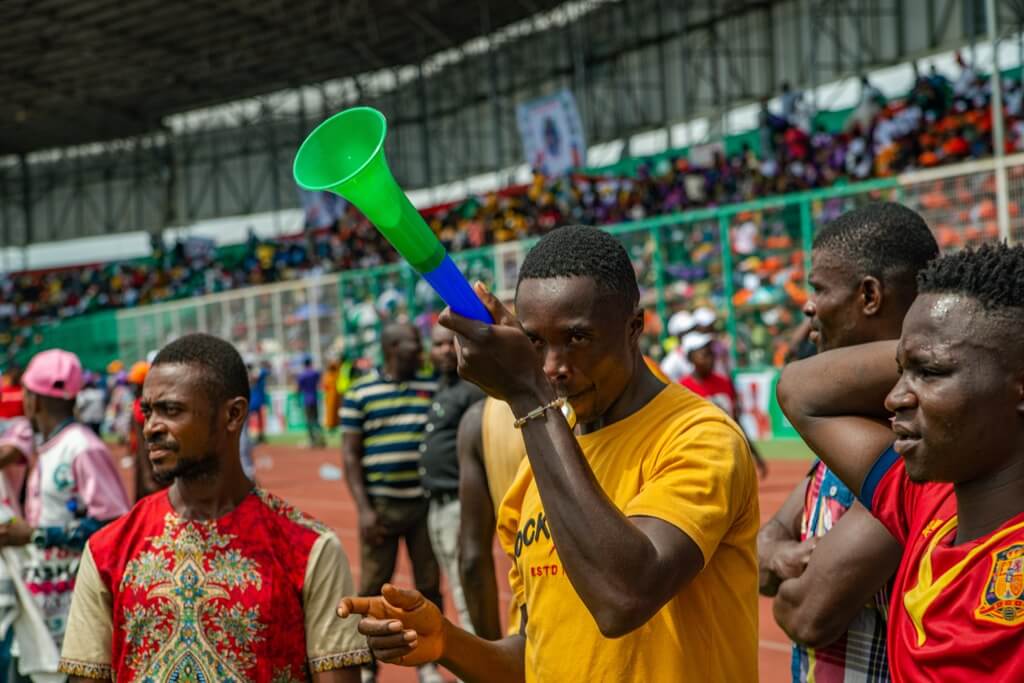Let’s face it; when you think of lively sports events, particularly in the realm of football, your mind might very well drift to the unmistakable buzz of the vuvuzela. That blaring horn sound, resonating across stadiums and television sets, is indeed a phenomenon that divides opinions like few others. But what’s the story behind it, and why does it evoke such intense feelings?
The Resonance of the Vuvuzela
It’s a sound you either passionately rally behind or fervently wish to silence. But why? This instrument has roots deep within ceremonies and gatherings long before it found its place in modern sports. When you hear its powerful hum, you’re not just hearing an instrument – you’re listening to generations of tradition.
A Beacon of Unity or a Bone of Contention?
During the 2010 FIFA World Cup, the world got a full blast of the vuvuzela. For some, it represented the joyous spirit of football. For others, it was an unwelcome distraction. But isn’t that what makes cultural symbols so intriguing? Their ability to elicit such strong reactions, both positive and negative, is testament to their significance. So, next time you hear its echoing sound, think about the conversations it’s sparking around the globe.
The Influence on Global Sports Culture
If you’ve ever been in a stadium, pulsating with the rhythm of thousands of vuvuzelas, you’d know that it’s an experience unlike any other. This instrument, often seen as a symbol of pride, has not only left its mark on South African sports culture but has also made ripples globally. With many international sports events now featuring its resonant hum, the vuvuzela’s influence is undeniable.
The Art and Technique
Sure, you might think it’s just about blowing into one end, but mastering the vuvuzela is an art in itself. You’d be surprised at the range of sounds and rhythms that can be produced with a little practice. So, if you’ve ever considered giving it a try, why not? Who knows, you might just find a newfound appreciation for this iconic horn.
The Sound That Divided the World
Indeed, the vuvuzela has become synonymous with South African football, marking moments of celebration, encouragement, and even intimidation.
But, like any influential cultural icon, the vuvuzela hasn’t escaped controversy. In some regions, authorities have opted to ban its sale, citing potential health concerns. Whether these concerns revolve around potential hearing damage from prolonged exposure or other medical reasons, it’s evident that the horn’s blaring notes have caused more than a few raised eyebrows.
Yet, for every critic, there’s an ardent supporter. Cameroonian football enthusiast Mussa Bouba sums up this sentiment perfectly: “With the vuvuzela, we encourage our own teams while intimidating our opponents.” It’s more than just an instrument; it’s a strategy, a piece of psychological warfare, and an emblem of camaraderie.
However, the real debate around the vuvuzela gained momentum during the World Cup. This global platform introduced the vuvuzela to a vast audience, many of whom were hearing its distinctive drone for the first time. For some, it was an intrusion – a relentless hum that drowned out commentary, chants, and the natural sounds of the game. Broadcasters scrambled for a solution, tinkering with sound frequencies in an attempt to mitigate the horn’s dominance. Yet, these efforts only birthed a more artificial sound, further alienating viewers who cherished the authentic atmosphere of football matches.
Deepening the debate is the question of cultural appreciation versus global standards. Is muting or altering the vuvuzela sound a way to align with global broadcast standards? Or is it an inadvertent muffling of a nation’s cultural expression?
The Health Debate
But, like every influential cultural icon, the vuvuzela has faced its critics. Some local authorities have curtailed its sale, flagging potential health implications. The exact concerns might revolve around potential hearing damage or other medical issues, highlighting that the horn’s resounding notes haven’t gone unnoticed.
An Emblem of Camaraderie and Strategy
For every naysayer, there exists a passionate supporter. Mussa Bouba, a football enthusiast from Cameroon, captures this sentiment: “With the vuvuzela, we encourage our teams and intimidate our opponents.” For him and many others, it’s more than just an instrument. It represents camaraderie, strategy, and a touch of psychological gameplay.
Cultural Expression or Global Standardization?
This raises pertinent questions about cultural appreciation versus global broadcast standards. Is modifying the vuvuzela’s sound a nod to global viewership preferences, or an unintentional silencing of cultural expression?
History of The Mighty Vuvuzela
- Origins in the African Landscape The roots of the vuvuzela trace back to African traditions, where similar horns were used during special ceremonies and to summon community members for gatherings. These instruments, made from kudu horns, called ‘kuduzelas’, were integral to certain tribes in Southern Africa. Over time, as materials evolved, the modern plastic vuvuzela emerged, brightly colored and easily manufactured, making it accessible to the masses.
- The Soundtrack of South African Football Its association with football began to cement in the late 20th century. As South African football clubs started gaining prominence, fans began using the vuvuzela to create an atmosphere of unity and intimidation. You could feel the power of collective euphoria as the horns were blown in unison, a sonic wave washing over the stadiums.
- Controversies and the Vuvuzela Debate However, the very essence that made it special within South African borders – its loud, resonating sound – became a point of contention globally. The 2010 FIFA World Cup, hosted by South Africa, was a turning point. The vuvuzela’s sound was omnipresent, leading to global discussions about its appropriateness at such an international event. Broadcasters, inundated with complaints, even sought technological solutions to minimize the vuvuzela’s overpowering noise in broadcasts.
- A Symbol of Cultural Identity Beyond the sound, the vuvuzela took on a symbolic role. For South Africans, it was a proud showcase of cultural heritage. For some international spectators, it was a noisy distraction. The dichotomy highlighted crucial questions about cultural representation, especially when global and local perspectives collide.
Pros and Cons of South Africa’s Sound Phenomenon
When it comes to the vuvuzela, it’s clear that this simple instrument generates a multitude of opinions. Here, we’ll delve into the pros and cons that define the relationship many have with the vuvuzela, especially in the context of its role in South African culture and sports.
Pros:
- Cultural Significance: The vuvuzela is rooted in South African tradition. Its origins tie back to instruments used in significant tribal ceremonies, making it a symbol of cultural heritage.
- Stadium Ambiance: In football matches, the vuvuzela creates a unique atmosphere, fostering unity among fans. Its sound, especially when blown in unison, provides a collective voice to the excitement and tension of the game.
- Identity and Pride: For many South Africans, the vuvuzela is a source of national pride. It represents the country’s ability to bring a distinct flavor to global events, like the FIFA World Cup in 2010.
- Economic Benefits: The popularity of the vuvuzela, especially during the 2010 World Cup, boosted its sales. Local manufacturers and vendors benefited from the global interest.
- Versatility: As Cameroonian football fan Mussa Bouba mentioned, the vuvuzela can serve dual purposes: cheering for one’s team while also intimidating opponents.
Cons:
- Noise Levels: The dominant criticism is the sheer volume of the vuvuzela. Its blaring sound can overshadow other aspects of an event, becoming a distraction for many.
- Health Concerns: Some local governments have cited potential health hazards, believing prolonged exposure to the vuvuzela’s sound can harm human hearing.
- Global Backlash: The 2010 FIFA World Cup showcased the vuvuzela to a global audience. Many international viewers found its constant drone irritating, leading to a global debate about its appropriateness.
- Broadcasting Issues: The overpowering sound of vuvuzelas during the World Cup led broadcasters to seek ways to minimize or alter its sound, often resulting in an artificial-sounding broadcast.
- Cultural Misunderstanding: While it’s a symbol of pride for South Africans, its reception on the global stage has sometimes been less than respectful, leading to potential cultural misunderstandings and misrepresentations.
Your Take on the Debate
The beauty of cultural symbols like the vuvuzela is that they allow for open discussion and diverse opinions. Love it or loathe it, it’s hard to ignore. So, what’s your stance? Is it a sound that fills you with joy and nostalgia, or one you’d rather mute? Regardless of where you stand, it’s essential to appreciate the rich tapestry of experiences and emotions it brings to the fore.
If the vuvuzela’s melody – or maelstrom, depending on your perspective – has piqued your curiosity, or if you’re keen on understanding its intricate ties with South African heritage, Johan Botha is the voice you’d want to heed.
Eager to learn more? Want to dive into a riveting discussion? Johan welcomes further engagement. Simply reach out through our contact form, and you’ll be one step closer to unraveling the enigma of the vuvuzela with an expert by your side.




